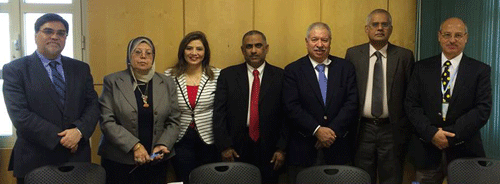WONCA EMR meeting report
 Photo (r to l): Dr Mohamed Assai, Coordinator, Integrated Service Delivery; Dr Sameen Siddiqi, Director, Health System Development; Dr Mohamed Tarawneh, President, WONCA EMR; Dr Mohammed Shafee, WONCA EMR Executive member, President, Oman Family Medicine Society; Dr Oraib Alsmadi, WONCA EMR Honorary treasurer, WONCA EMR Executive member, President, Jordan Society of Family Medicine; Prof Taghreed Farhat, WONCA EMR Executive member, President, Egyptian Family Medicine Society; Dr Hassan Salah, Technical Officer, Primary and Community Health Care
Photo (r to l): Dr Mohamed Assai, Coordinator, Integrated Service Delivery; Dr Sameen Siddiqi, Director, Health System Development; Dr Mohamed Tarawneh, President, WONCA EMR; Dr Mohammed Shafee, WONCA EMR Executive member, President, Oman Family Medicine Society; Dr Oraib Alsmadi, WONCA EMR Honorary treasurer, WONCA EMR Executive member, President, Jordan Society of Family Medicine; Prof Taghreed Farhat, WONCA EMR Executive member, President, Egyptian Family Medicine Society; Dr Hassan Salah, Technical Officer, Primary and Community Health Care
WONCA East Mediterranean Region had an important meeting with WHO EMRO in January 2014, based on our first meeting with H E Dr Ala Alwann WHO RD, in Oman last October.
The important points that we focused on with WHO:
1. Share family practice [FP] status in the EMR countries.
2. Summarize WONCA EMR structure and current activities.
3. Discuss options for future collaboration between WHO and WONCA EMR.
Attendees:
• Dr Sameen Siddiqi, Director, Health System Development.
• Dr Mohamed Tarawneh, President, WONCA EMR.
• Dr Mohammed Shafee, WONCA EMR Executive member, President, Oman Family Medicine Society.
• Dr Oraib Alsmadi, WONCA EMR Honorary treasurer, WONCA EMR Executive member, President, Jordan Society of Family Medicine.
• Prof Taghreed Farhat, WONCA EMR Executive member, President, Egyptian Family Medicine Society.
• Dr Mohamed Assai, Coordinator, Integrated Service Delivery.
• Dr Mohi Eldin Magzoub, Regional Advisor, Health Professionals Education.
• Dr Hassan Salah, Technical Officer, Primary and Community Health Care.
• Mrs Evelyn Hannalla, Programme Assistant, Primary and Community Health Care.
The attendees had several observations during the presentations and discussions; the following is brief of their comments:
1. Importance of countries’ political support for implementation of FP programs.
2. The need of short term training for general practitioners to overcome the major bottleneck of shortage in family physicians. Such training programs will not be replaced the current academic degree in family medicine.
3. Technical support to EMR low income countries with alternative models of care delivery to improve access to quality PHC services ensuring continuity of care.
4. Linkages of current primary and secondary health care services in support of FP program.
5. The importance of developing criteria for accreditation of PHC facilities.
6. Limited family medicine departments at EMR with unattractive FP career.
7. Family practice in private sector and its role to expand the FP concept.
8. Factors which attract physicians to family practice specialty including clear career path, decent salary (at least similar to other specialties), and practice in private sector and to include family medicine in the undergraduate curriculum.
9. The impact of family physicians’ migration from Egypt, Jordan and Sudan to GCC.
10. The importance of joint missions for WHO and WONCA for technical support of EMR countries.
11. The importance of developing detailed FP norms and standards
12. The neglected significant community role in FP implementation
The following topics are those that WHO and WONCA agreed for collaboration during 2014.
1. Finalizing the document prepared by WHO/EMRO titled: “Conceptual and strategic approach for family practice” and sharing the comments of WONCA in this document, by the end of February, 2014
2. Organizing inter-country Consultation Meeting Towards UHC in the EMR through FP, in the first week of September 2014
3. Conduct “situational analysis of training programs on FP in EMR countries”, first draft before end of May 2014
4. Technical support to EMR countries in implementation of FP, ongoing activity over 2014
5. Organizing a short training course for GPs on family medicine, before end of October 2014
6. Improving quality of health care delivery, End of 2014
7. Advocating for WONCA , assign contact person/ association for WONCA in each EMR country, before end of April 2014
Moh’d Tarawneh
WONCA East Mediterranean Region President